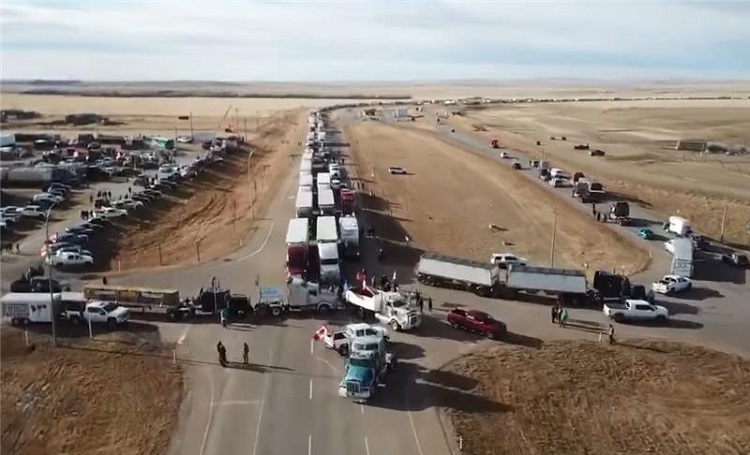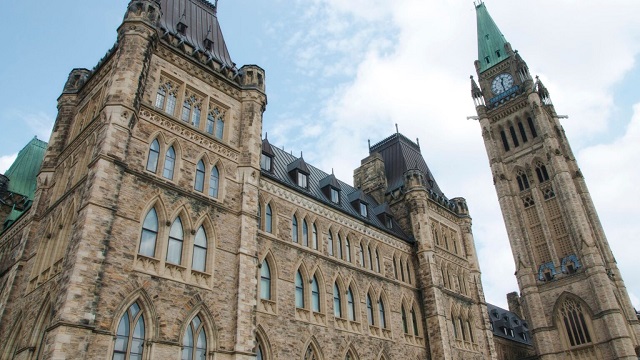Agriculture
Canadian Agriculture More Energy Intensive, More Efficient

Canadian Agriculture More Energy Intensive, More Efficient
It’s no secret that agriculture has contributed to climate change through various means. For example, you may know that livestock generates greenhouse gas emissions due to how farms process it. That said, it’s now clear that farmers have found sustainable ways to offset those contributions. In Canada, it’s all about energy use.
Here’s how Canadian farmers have become more efficient as they raise crops and livestock, setting a standard the world should follow.
Energy Demand and Consumption Have Fluctuated
The demand for energy has increased across the agricultural sector as a whole. However, it’s key to note that farmers have begun to use less energy despite that fact. That points to more efficient practices. The farmers who complete their work productively save time, money and energy. As a result, Canadian workers have reduced their energy consumption per dollar by 17%. That’s thanks to sustainability.
The most common energy sources include fuel, gas and electricity. It’s how farmers use those resources that counts. Combined with technology choices and new practices, it’s clear that efficiency is more achievable than ever.
What Contributes to This Phenomenon?
It’s crucial for people in agriculture to explore eco-friendly alternatives. The grasslands that many western Canadian farmers cultivate contains excess carbon, so you can imagine what the country as a whole holds underneath its surface. Farmers have now adopted new methods to adjust how they harvest their crops. These systems are better for production, as well as soil and seed health overall.
The agriculture industry has gone through many changes, too. There are fewer farms — but those that still operate have employed agricultural technology to be as efficient as possible. These tools include different equipment that cuts down on time to increase proficiency. Plus, it’s now more common to use solar power as an alternative to traditional energy solutions.
Why Accuracy and Precision Matters
It’s a lot easier to be energy efficient when you don’t waste your resources. The means farmers practiced before they used specific innovations often created a time deficit. If you have a smaller machine, you likely need to do twice as much work. However, when you have access to equipment that fits your field, you don’t have to be as wasteful. The accuracy and precision created by technology make this a reality.
Soil Conservation Is Led by Ranchers
Many farmers have looked to ranchers for help. It’s a native part of ranching to preserve topsoil and other elements that are inherently sustainable. As a result, it seems like ranchers have been leading the charge against climate change for decades. The tactics they use to avoid tilling soil, for example, help preserve the amount of carbon that lies underneath the Earth’s surface.
The “no-till” practice is efficient in its own right. Rather than till your soil to plant a new crop, you simply leave behind what’s already there. This method is much better for soil nutrition, and it can keep carbon exposure at bay. As a result, you have much fewer carbon emissions. In general, the idea of soil conservation isn’t a new one, but old tricks can still work alongside modern technology.
The Future of Agriculture in Canada Looks Bright
If farmers continue on this path, it’ll be clear that climate solutions are at the forefront of their minds. These efforts create more benefits for them as they save time and money. Plus, there’s always the responsibility of maintaining the planet’s health. After all, without a strong ecosystem, agriculture would suffer. Through means that are more accurate and conservative, Canadian farmers have been able to become more efficient. Click here read more stories by Emily Folk.

I’m Emily Folk, and I grew up in a small town in Pennsylvania. Growing up I had a love of animals, and after countless marathons of watching Animal Planet documentaries, I developed a passion for ecology and conservation.
Agriculture
Bill C-282, now in the Senate, risks holding back other economic sectors and further burdening consumers

From the Frontier Centre for Public Policy
Bill C-282 currently sits in the Canadian Senate and stands on the precipice of becoming law in a matter of weeks. Essentially, this bill seeks to bestow immunity upon supply management from any potential future trade negotiations without offering increased market access to potential trade partners.
In simpler terms, it risks holding all other economic sectors hostage solely to safeguard the interests of a small, privileged group of farmers. This is far from an optimal scenario, and the implications of this bill spell bad news for Canadians.
Supply management, which governs poultry, egg, and dairy production in Canada, has traditionally enabled us to fulfill our domestic needs. Under this system, farmers are allocated government-sanctioned quotas to produce food for the nation. At the same time, high tariffs are imposed on imports of items such as chicken, butter, yogurt, cheese, milk, and eggs. This model has been in place for over five decades, ostensibly to shield family farms from economic volatility.
However, despite the implementation of supply management, Canada has witnessed a comparable decline in the number of farms as the United States, where a national supply management scheme does not exist. Supply management has failed to preserve much of anything beyond enriching select agricultural sectors.
For instance, dairy farmers now possess quotas valued at over $25 billion while concurrently burdening dairy processors with the highest-priced industrial milk in the Western world. Recent data indicates a significant surge in prices at the grocery store, with yogurt prices alone soaring by over 30 percent since December 2023. This escalation is increasingly straining the budgets of many consumers.
It’s evident to those knowledgeable about the situation that the emergence of Bill C-282 should come as no surprise. Proponents of supply management exert considerable influence over politicians across party lines, compelling them to support this bill to safeguard the interests of less than one percent of our economy, much to the ignorance of most Canadians. In the last federal budget, the dairy industry alone received over $300 million in research funds, funds that arguably exceed their actual needs.
While Canada’s agricultural sector accounts for approximately seven percent of our GDP, supply-managed industries represent only a small fraction of that figure. Supply-managed farms represent about five percent of all farms in Canada. Forging trade agreements with key partners such as India, China, and the United Kingdom is imperative not only for sectors like automotive, pharmaceuticals, and biotechnology but for the vast majority of farms in livestock and grains to thrive and contribute to global welfare and prosperity. It is essential to recognize that Canada has much more to offer than merely self-sufficiency in food production.
Over time, the marketing boards overseeing quotas for farmers have amassed significant power and have proven themselves politically aggressive. They vehemently oppose any challenges to the existing system, targeting politicians, academics, and groups advocating for reform or abolition. Despite occasional resistance from MPs and Senators, no major political party has dared to question the disproportionate protection afforded to one sector over others. Strengthening our supply-managed sectors necessitates embracing competition, which can only serve to enhance their resilience and competitiveness.
A recent example of the consequences of protectionism is the United Kingdom’s decision to walk away from trade negotiations with Canada due to disagreements over access to our dairy market. Not only do many Canadians appreciate the quality of British cheese, but increased competition in the dairy section would also help drive prices down, a welcome relief given current economic challenges.
In the past decade, Canada has ratified trade agreements such as CUSMA, CETA, and CPTPP, all of which entailed breaches in our supply management regime. Despite initial concerns from farmers, particularly regarding the impact on poultry, eggs, and dairy, these sectors have fared well. A dairy farm in Ontario recently sold for a staggering $21.5 million in Oxford County. Claims of losses resulting from increased market access are often unfounded, as farmer boards simply adjust quotas when producers exit the industry.
In essence, Bill C-282 represents a misguided initiative driven by farmer boards capitalizing on the ignorance of urban residents and politicians regarding rural realities. Embracing further protectionism will not only harm consumers yearning for more competition at the grocery store but also impede the growth opportunities of various agricultural sectors striving to compete globally and stifle the expansion prospects of non-agricultural sectors seeking increased market access.
Dr. Sylvain Charlebois is senior director of the agri-food analytics lab and a professor in food distribution and policy at Dalhousie University.
Agriculture
Degrowth: How to Make the World Poorer, Polluted and Miserable

From StosselTV
Activists have a new goal: “DEgrowth.”
They say “growth is killing us.” They couldn’t be MORE wrong.
“Growth is not killing us. It’s saving us!” says author Johan Norberg. He explains why growth is essential to human progress, especially for poor people. “In poor countries, if you manage to grow by 4% annually over 20 years,” he points out, “that reduces poverty in that country on average by 80%.
But DEgrowth activists insist that growth means “climate chaos.” They say a smaller economy would be “sweeter.” They say “We must urgently dismantle capitalism!” It’s destructive nonsense. This video explains why.
————
To get our new weekly video from Stossel TV, sign up here: https://www.johnstossel.com/#subscribe
————
After 40+ years of reporting, I now understand the importance of limited government and personal freedom.
——————————————
Libertarian journalist John Stossel created Stossel TV to explain liberty and free markets to young people.
Prior to Stossel TV he hosted a show on Fox Business and co-anchored ABC’s primetime newsmagazine show, 20/20. Stossel’s economic programs have been adapted into teaching kits by a non-profit organization, “Stossel in the Classroom.” High school teachers in American public schools now use the videos to help educate their students on economics and economic freedom. They are seen by more than 12 million students every year.
Stossel has received 19 Emmy Awards and has been honored five times for excellence in consumer reporting by the National Press Club.
Other honors include the George Polk Award for Outstanding Local Reporting and the George Foster Peabody Award.
-

 Brownstone Institute1 day ago
Brownstone Institute1 day agoDeborah Birx Gets Her Close-Up
-

 Alberta1 day ago
Alberta1 day agoCoutts Three verdict: A warning to protestors who act as liaison with police
-

 Alberta1 day ago
Alberta1 day agoAlberta moves to protect Edmonton park from Trudeau government’s ‘diversity’ plan
-

 Energy1 day ago
Energy1 day agoCanada Has All the Elements to be a Winner in Global Energy — Now Let’s Do It
-

 espionage1 day ago
espionage1 day agoCanada’s intelligence chief says he personally warned Trudeau about China’s election meddling
-

 Business1 day ago
Business1 day agoMaxime Bernier warns Canadians of Trudeau’s plan to implement WEF global tax regime
-

 Frontier Centre for Public Policy2 days ago
Frontier Centre for Public Policy2 days agoThe tale of two teachers
-

 Freedom Convoy1 day ago
Freedom Convoy1 day agoOttawa spent “excessive” $2.2 million fighting Emergencies Act challenge





